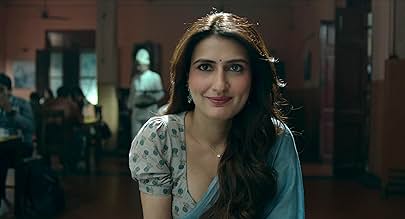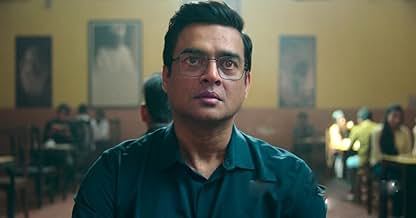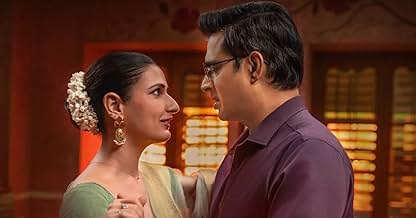CALIFICACIÓN DE IMDb
5.8/10
5.1 k
TU CALIFICACIÓN
Vidas de dos individuos únicos, Shrirenu Tripathi y Madhu Bose. Embárcate en un viaje lleno de giros inesperados, momentos sinceros y mucha diversión.Vidas de dos individuos únicos, Shrirenu Tripathi y Madhu Bose. Embárcate en un viaje lleno de giros inesperados, momentos sinceros y mucha diversión.Vidas de dos individuos únicos, Shrirenu Tripathi y Madhu Bose. Embárcate en un viaje lleno de giros inesperados, momentos sinceros y mucha diversión.
Opiniones destacadas
Vivek Soni's directorial debut delivers a competently crafted romantic drama that feels frustratingly familiar despite its earnest intentions. This Netflix original attempts to breathe fresh life into the middle-aged romance template, pairing the reliable charm of R. Madhavan with Fatima Sana Shaikh's spirited energy in a cross-cultural love story that tackles contemporary social issues with varying degrees of success. While the film succeeds in creating genuine moments of warmth and connection between its leads, it ultimately falls victim to the very conventions it seeks to challenge, resulting in a viewing experience that satisfies without truly surprising.
Soni demonstrates solid technical competence behind the camera, crafting a visually pleasant film that captures both the academic tranquility of Jamshedpur and the cosmopolitan vibrancy of Kolkata. The cinematography serves the story adequately without ever achieving the kind of visual poetry that might elevate the material above its generic roots. The production design effectively contrasts the traditional world of Sanskrit academia with the modern sensibilities of contemporary urban life, though these contrasts often feel more schematic than organic. The pacing remains steady throughout, though certain sequences drag when the script indulges in overly explanatory dialogue about societal expectations and gender roles.
Madhavan delivers exactly what audiences expect from him at this stage of his career: a measured, thoughtful performance that invests even mundane exchanges with genuine emotional weight. His portrayal of Shrirenu Tripathi, the reserved Sanskrit professor, captures both the character's inherent decency and his deep-seated insecurities about stepping outside societal norms. Shaikh brings considerable vivacity to Madhu Bose, though her character occasionally feels more like a symbol of liberation than a fully realized individual. The supporting cast, including Ayesha Raza and Manish Chaudhari, provides solid work within the confines of their somewhat predictable roles as family members representing various degrees of traditional resistance.
The film's greatest strength lies in its willingness to address serious topics about patriarchal expectations and the challenges facing middle-aged individuals seeking romantic fulfillment. However, these themes often receive treatment that feels more dutiful than inspired, with conversations that sound more like position statements than natural dialogue. The script, penned by Radhika Anand and Jehan Handa, demonstrates clear knowledge of contemporary social discourse but struggles to integrate these ideas seamlessly into the romantic framework. The result is a film that occasionally preaches when it should simply observe, undermining the very naturalism that makes the central relationship compelling.
Despite these structural weaknesses, the film generates genuine emotional resonance in its quieter moments. The developing relationship between Shrirenu and Madhu benefits from both performers' commitment to finding truth within familiar situations. Their chemistry feels authentic rather than manufactured, allowing viewers to invest in their journey even when the surrounding circumstances feel contrived. The cultural clash between traditional expectations and personal desire provides rich material, though the film's resolution leans toward the overly tidy.
Soni demonstrates solid technical competence behind the camera, crafting a visually pleasant film that captures both the academic tranquility of Jamshedpur and the cosmopolitan vibrancy of Kolkata. The cinematography serves the story adequately without ever achieving the kind of visual poetry that might elevate the material above its generic roots. The production design effectively contrasts the traditional world of Sanskrit academia with the modern sensibilities of contemporary urban life, though these contrasts often feel more schematic than organic. The pacing remains steady throughout, though certain sequences drag when the script indulges in overly explanatory dialogue about societal expectations and gender roles.
Madhavan delivers exactly what audiences expect from him at this stage of his career: a measured, thoughtful performance that invests even mundane exchanges with genuine emotional weight. His portrayal of Shrirenu Tripathi, the reserved Sanskrit professor, captures both the character's inherent decency and his deep-seated insecurities about stepping outside societal norms. Shaikh brings considerable vivacity to Madhu Bose, though her character occasionally feels more like a symbol of liberation than a fully realized individual. The supporting cast, including Ayesha Raza and Manish Chaudhari, provides solid work within the confines of their somewhat predictable roles as family members representing various degrees of traditional resistance.
The film's greatest strength lies in its willingness to address serious topics about patriarchal expectations and the challenges facing middle-aged individuals seeking romantic fulfillment. However, these themes often receive treatment that feels more dutiful than inspired, with conversations that sound more like position statements than natural dialogue. The script, penned by Radhika Anand and Jehan Handa, demonstrates clear knowledge of contemporary social discourse but struggles to integrate these ideas seamlessly into the romantic framework. The result is a film that occasionally preaches when it should simply observe, undermining the very naturalism that makes the central relationship compelling.
Despite these structural weaknesses, the film generates genuine emotional resonance in its quieter moments. The developing relationship between Shrirenu and Madhu benefits from both performers' commitment to finding truth within familiar situations. Their chemistry feels authentic rather than manufactured, allowing viewers to invest in their journey even when the surrounding circumstances feel contrived. The cultural clash between traditional expectations and personal desire provides rich material, though the film's resolution leans toward the overly tidy.
The first half is great with a nice bit of comedy. Madhavan is solid most part of it except in some scenes. Overall after long could watch a Bollywood move in one go so is captivating enough.
The movie tries to convey a one sided message of males being judgemental, well the movie itself is judgemental in judging the males so ! When in reality lot of females probably will have issues too or will be judgemental for the kind of things they may believe are ok for them to do or are very cool about (Pyar Ka Panchanama portrays this well). Also probably the dramatic angle of Kusum bhabhi getting involved could've been avoided and rather stick to main story line. This side story also unknowingly (or maybe intentionally) conveys the wrong message of overruling a long standing family structure assuming probably an attraction or a lending shoulder to be love. Many a families have been destroyed with such "love".
If the point of the movie is love only seeks love, then institution of marriage probably shouldn't exist. It is very convenient and affordable to be loving when stakes are not equally high like in marriage.
The movie tries to convey a one sided message of males being judgemental, well the movie itself is judgemental in judging the males so ! When in reality lot of females probably will have issues too or will be judgemental for the kind of things they may believe are ok for them to do or are very cool about (Pyar Ka Panchanama portrays this well). Also probably the dramatic angle of Kusum bhabhi getting involved could've been avoided and rather stick to main story line. This side story also unknowingly (or maybe intentionally) conveys the wrong message of overruling a long standing family structure assuming probably an attraction or a lending shoulder to be love. Many a families have been destroyed with such "love".
If the point of the movie is love only seeks love, then institution of marriage probably shouldn't exist. It is very convenient and affordable to be loving when stakes are not equally high like in marriage.
I watched this movie primarily for R. Madhavan, and he truly delivered an excellent performance. His chemistry with Fatima Sana Shaikh was a definite highlight and widely appreciated.
The film began on a strong note, with each actor doing justice to their role. However, after Curt's arc, the narrative noticeably slowed and unfortunately took on a TV-serial-like tone. Combined with weak dialogues and an underwhelming background score, it became difficult to stay emotionally engaged.
The cinematography stood out, especially in its portrayal of Kolkata's old-world charm. The music compositions and background score were also well-received. However, the integration of side characters felt weak and unconvincing.
While individual performances were commendable, the family chemistry lacked depth toward the end. Although the core message - mutual respect in marriage and relationships - was meaningful, its execution could have been more impactful.
The film began on a strong note, with each actor doing justice to their role. However, after Curt's arc, the narrative noticeably slowed and unfortunately took on a TV-serial-like tone. Combined with weak dialogues and an underwhelming background score, it became difficult to stay emotionally engaged.
The cinematography stood out, especially in its portrayal of Kolkata's old-world charm. The music compositions and background score were also well-received. However, the integration of side characters felt weak and unconvincing.
While individual performances were commendable, the family chemistry lacked depth toward the end. Although the core message - mutual respect in marriage and relationships - was meaningful, its execution could have been more impactful.
At one point in the movie she says that a nerdy guy like him and a cute girl like her would make a nice romcom . Unfortunately this doesn't happen and what follows is a collection of pointless scenes with confused sentiments.
The plot is about a shy, docile, unromantic Sanskrit teacher Shrirenu who plays a Sitar and a young lady Madhu teaching French language who plays a piano. He belongs to a middle class family of Jamshedpur while she belongs to a Bengali family based in Kolkata.
Despite their different approaches to life both get along fine at first, romance blooms but there are disagreements over petty issues and they break up. They love each other and later when their misunderstandings are getting cleared Madhu's earlier boyfriend makes an appearance. This complicates matters and creates the customery triangle but worse follows when there is an emotional upheaval in both families.
The movie meanders between the endearing and the insipid. While the vicissitudes of romantic relationships are well projected there are quite a few totally unconvincing scenarios in the families of couple. To me the plot twist at the end appeared grossly unconvincing and outlandish. Overall the movie looked like a missed opportunity for the makers. Both Madhavan and Fatima do what the character limitations permit them to do but these characters could have made a better impression if the plotline was realistic and stronger.
The plot is about a shy, docile, unromantic Sanskrit teacher Shrirenu who plays a Sitar and a young lady Madhu teaching French language who plays a piano. He belongs to a middle class family of Jamshedpur while she belongs to a Bengali family based in Kolkata.
Despite their different approaches to life both get along fine at first, romance blooms but there are disagreements over petty issues and they break up. They love each other and later when their misunderstandings are getting cleared Madhu's earlier boyfriend makes an appearance. This complicates matters and creates the customery triangle but worse follows when there is an emotional upheaval in both families.
The movie meanders between the endearing and the insipid. While the vicissitudes of romantic relationships are well projected there are quite a few totally unconvincing scenarios in the families of couple. To me the plot twist at the end appeared grossly unconvincing and outlandish. Overall the movie looked like a missed opportunity for the makers. Both Madhavan and Fatima do what the character limitations permit them to do but these characters could have made a better impression if the plotline was realistic and stronger.
*The film normalizes toxic relationships (of kamala bhabhi) under the guise of passion and spontaneity, sending questionable messages to the younger generation.*
Instead of promoting communication, respect, and personal growth, the film glorifies possessiveness and impulsive decisions. Characters jump into intense commitments without self-awareness or maturity. Being transparent, resolving past ties respectfully, and giving yourself and others emotional clarity is not only fair but necessary for future peace.
It may entertain, but it fails to set a positive example for viewers who are still forming their understanding of healthy relationships.
Instead of promoting communication, respect, and personal growth, the film glorifies possessiveness and impulsive decisions. Characters jump into intense commitments without self-awareness or maturity. Being transparent, resolving past ties respectfully, and giving yourself and others emotional clarity is not only fair but necessary for future peace.
It may entertain, but it fails to set a positive example for viewers who are still forming their understanding of healthy relationships.
¿Sabías que…?
- TriviaThere was a shelved movie Sunflag Universal's "Aap Jaisa Koi Nahin"(1999) Starring Puru Raaj Kumar,Sharbani Mukherjee,Ronit Roy,Raj Babbar,Shakti Kapoor, Himani Shivpuri,Aushim Khetarpal,Raza Murad,Ishrat Ali,Anil Nagrath,Vishwajeet Pradhan,Kader Khan, Aruna Irani,Special Appearance by Govinda, Music by Jatin Lalit,Produced by Saleem Ali Khan,Bhushan Verma, Directed by Saleem Khan.
Selecciones populares
Inicia sesión para calificar y agrega a la lista de videos para obtener recomendaciones personalizadas
Detalles
- Fecha de lanzamiento
- País de origen
- Sitio oficial
- Idiomas
- También se conoce como
- Aap Jaisa Koi
- Productora
- Ver más créditos de la compañía en IMDbPro
- Tiempo de ejecución
- 1h 54min(114 min)
- Color
- Mezcla de sonido
- Relación de aspecto
- 1.85 : 1
Contribuir a esta página
Sugiere una edición o agrega el contenido que falta

![Ver Trailer [OV]](https://m.media-amazon.com/images/M/MV5BYzNmMWRlNjctZGQ0Yy00ZDVlLWIxZjItNzcwZmQ1YzEzYmM2XkEyXkFqcGdeQXRyYW5zY29kZS13b3JrZmxvdw@@._V1_QL75_UX500_CR0)



























